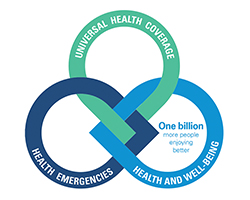Promoting health and well-being

People place great value on living in safe and supportive communities, where the social and physical environment favours physical, psychological and social health and well-being. They expect health authorities to protect them and their families from what threatens their health and well-being: by deploying dedicated public health programmes and policies to tackle determinants of health; by mobilizing other sectors to put health in all policies; by promoting initiatives that address local determinants of health with green deal investments into a future economy of well-being.
In modernizing societies, such expectations become more emphatic. Health leaders derive much of their authority from their response; when they are perceived to fail, it is promptly sanctioned by a loss of trust, authority and legitimacy. Public policies for the public’s health are thus as important politically as they are technically necessary to move towards UHC.
The cluster of activities and programmes to promote health and well-being throughout the life cycle brings together public health traditions that have shaped the work of WHO over decades: the disease-control and environmental hygiene programmes that were its foundation; the work on essential public health functions, social determinants and renewal of primary health care; and the push for health in all policies especially between health and social policy. Together with progress towards UHC, they speak to the broader social trend of moving towards an economy of well-being.
The actions for prevention and promotion of health and well-being require programmes with a visible commitment to dedicated and specific public health efforts. Over time, WHO/Europe has developed an extensive technical portfolio (see Box 2 above) that builds the necessary evidence base. These programmes take a life-course approach to address the determinants of health and well-being, with due attention paid to sexual and reproductive health and rights,3 and to the impact of gender inequality, inequity and poverty on health and social cohesion. They use a wide range of entry points, from local community initiatives to intergovernmental regulatory arrangements. They have in common the aim of creating an environment that responds to citizens’ concerns for safer, healthier and better living.
The EPW emphasizes the importance given to this priority by pooling efforts in five workstreams:
- Supporting local living environments that enable health and well-being
- Promoting safer, healthier and better lives
- Improving patient safety and tackling antimicrobial resistance
- Developing strategic intelligence on levels and inequalities of health and well-being
- Reviewing major well-established programmes within WHO/Europe’s technical portfolio, assessing their need for improved efficiency through innovation in terms of digitalization, technology and organization
WHO/Europe’s work on health and well-being is complemented by two further crosscutting flagship initiatives: the European Immunization Agenda 2030; and Healthier choices: Incorporating behavioural and cultural insights



